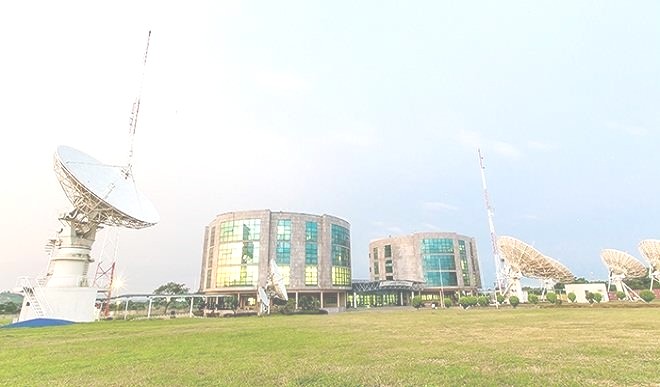The Force Headquarters Abuja of the Nigeria Police is investigating alleged cases of abuse of office, contract scams and misappropriation of fund in Nigerian Communications Satellite Ltd (NIGCOMSAT) Limited beginning 2011 to date, IT Edge News has learnt.
Government plans to ultimately sell off the entity as a “miscarried enterprise and also transfer part of its existing mandate particularly areas that has to do with space research to the National Space Research and Development Agency (NASRDA),” persons with knowledge of the matter revealed in Abuja.
“Notwithstanding whatever decision government reached or what the Force Headquarters is doing, both the Independent Corrupt Practices and Other Related Offences Commission (ICPC) and Economic and Financial Crimes Commission (EFCC) are already under mandate to investigate the mess in NIGCOMSAT from 2006 when it was officially incorporated,” one source told IT Edge News.
The two agencies are empowered by their enabling acts to investigate and prosecute cases of corruption.
Domiciled under the Federal Ministry of Communications, Innovation and Digital Economy, NIGCOMSAT has had to contend with series of petitions and accusations of contract scams, “administrative and operational” inefficiency all of which have ensured the inability of the company to be profitable.
In 2020, the House of Representatives instituted a broad forensic probe of NIGCOMSAT involving its Committees on Information Technology (ICT); Finance; and Insurance and Actuarial Matters. The allegations before the committees were damning. They included “alleged sleaze, contract padding and influencing, staff racketeering, misappropriation, unauthorized fund diversion, and non-profitability.”
The committees also scrutinized some petitions including those of Concerned Organized Professionals for Technology Advancement of Nigeria (COPTAN) that alleged among others that “NIGCOMSAT has deteriorated to become a white elephant project marked by gradual decay of acquired communication infrastructures; vast waste of public funds by NIGCOMSAT managers on ill-conceived projects that have nothing to do with the original mandate of NIGCOMSAT; the aim being to provide alibis with which millions of naira are routinely siphoned into private pockets; and a public company with a high degree of apathy and retinue of staff that are incompetent and largely recruited to satisfy the whims and caprices of political figures.”
Critics alleged that as a commercial entity, NIGCOMSAT has brought no tangible value from the huge investment channeled into it over the years in excess of five trillion naira.
“The company has not made one single kobo and I can assure that this government is not going to waste time in deciding its fate,” said a senior official of Federal Ministry of Communications, Innovation and Digital Economy in Abuja.
The ministry is currently working to unveil its 2023-2027 Strategic Blueprint.
IT Edge News got insight into the roadmap from a senior functionary who stated that: “Government wants to create jobs in functional ways; support innovators, entrepreneurs with ready access to funds; leverage global networks; remodel agencies that have become moribund like NIPOST; privatise or commercialise those that are both administrative and economic burden to government like NIGCOMSAT. The strategic plan document will provide that roadmap and make that statement.”
Below is a brief financial standing of NIGCOMSAT in a 2020 report by the ICIR.
A study of Nigeria’s budgets from 2009 to 2020 reveals that up to N43.5 billion has been allocated to the centre.
Figures from the office of the accountant-general further show between 2011 and 2017, not lesser than N13.3 billion was released to it for capital expenditures, out of which it spent N12.6 billion.
Its wage bill, which started as N747 million in 2009, has jumped to N2.6 billion. With 397 employees as of 2016 and a personnel cost of N2.3 billion that year, the Federal Government must have paid the workers an average of N5.8 million per annum (or N480,000 a month).
Nigeria has also had to service debt owed to the Chinese government for many years.
Funding for the satellite launch had included $51 million from the Nigerian government and a $200 million loan from China’s Exim Bank.
Data from the Debt Management Office show that between 2011 and 2014, debt service payments for NigComSat amounted to $127 million, and between 2015 and 2017, the amount left to be paid for the project dropped from $50 million to $10 million.
But there is little to show for the huge investment, allocations, and salaries.
According to a 2016 report by Punch Newspaper, the company generated only N584 million in revenue between 2011 and 2014. Put differently, its revenue in those four years constitutes only 3 per cent of its expenses on salaries and capital projects during the same period (N19 billion).

































